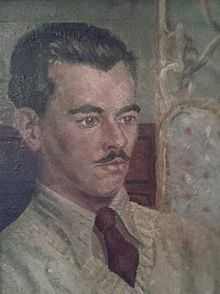Kenneth Spring
| Kenneth Spring OBE TD | |
|---|---|
 Kenneth Spring painted in 1948. | |
| Born |
23 October 1921 Dulwich, London |
| Died |
25 December 1997 (aged 76) Sibford, Oxfordshire |
| Allegiance |
|
| Service/branch |
|
| Years of service | 1941-1975 |
| Rank | Lieutenant Colonel |
| Battles/wars | Burma Campaign (Second World War) |
| Awards | Officer of the Order of the British Empire, Efficiency Decoration |
Lieutenant Colonel Kenneth Arthur Spring OBE TD (23 October 1921 – 25 December 1997) was a British Army officer, artist and co-founder of the National Youth Theatre of Great Britain.
Early life and family
Spring was born in Dulwich, London, the son of Albert Spring, a former Royal Flying Corps officer and schoolmaster, and the composer, Dorothy Spring.[1] Spring was a descendant of the Suffolk Spring family, and a relation of Lord Risby and Brigadier-General Frederick Spring.[2] He was educated at Alleyn's School and the University of London.
Military career
At the outbreak of the Second World War, Spring registered as a conscientious objector and was conscripted into the Non-Combatant Corps (NCC). With other members of the NCC, he went on to volunteer for work in bomb disposal in London, attached to the Royal Engineers. He later resigned his status as a conscientious objector, and on 23 July 1944 he was commissioned into the Royal Regiment of Artillery and undertook mountain artillery training in northern England.[3] He was posted to India in October 1944, taking command of a battery in the 33rd Mountain Regiment, Indian Army, part of the divisional artillery of the 25th Indian Infantry Division. Spring saw extensive action in the Burma Campaign 1944–45, during which he was injured. On 30 March 1945 he was promoted to war substantive lieutenant. Spring was involved in Operation Zipper and was the Station Staff Officer in Malaya during the Japanese surrender there. He returned to the United Kingdom in February 1946 following the disbandment of the 25th Division. On 22 April 1947 he was released from regular service due to his wartime injuries and transferred to the Territorial and Army Volunteer Reserve, becoming honorary lieutenant.[4] He was promoted to acting captain on 17 November 1948 and to honorary lieutenant colonel on 25 April 1974. He relinquished his commission in 1975, and was invested as an Officer of the Order of the British Empire (Military) that same year.[5] Spring was also awarded the Efficiency Decoration for long service in 1958.[6]
Later life
Shortly after returning to England, Spring started to teach art at his alma mater, Alleyn’s School,[7] having received tutelage from Sir William Coldstream, whom he met whilst serving in the Royal Artillery. In 1956, he helped Michael Croft to found the National Youth Theatre.[8][9][10] Spring also taught art at Camberwell College of Arts and Goldsmiths, University of London. In the 1960s Spring moved to Oxfordshire to become a master at Bloxham School.
Spring married Doreen Healy in 1947 and together they had two children:[11]
- David Spring (1948-1982), married Elizabeth Gibbs[12]
- Michael Spring (b.1953), married Penelope Johns Taylor[13]
He died on 25 December 1997 in Oxfordshire and is buried in Bloxham. In 2008, a previously unnamed and unascended mountain in East Greenland was named 'Colonel's Peak' in memory of Spring, following the first ascent of the mountain by his grandson.[14]
References
- ↑ John Lanchbery, 'Ken Spring obituary', Edward Alleyn Club Magazine (Spring 1998).
- ↑ ThePeerage.com (#526614) http://thepeerage.com/p52662.htm#i526614
- ↑ The London Gazette, 7 November 1944 http://www.london-gazette.co.uk/issues/36779/supplements/5069/page.pdf
- ↑ The London Gazette, 22 April 1947 https://www.thegazette.co.uk/London/issue/37935/supplement/1764/data.pdf
- ↑ The London Gazette, 1 January 1975 http://www.london-gazette.co.uk/issues/46444/supplements/6
- ↑ The London Gazette, 11 June 1974 https://www.thegazette.co.uk/London/issue/46318/supplement/6867/data.pdf
- ↑ Edward Alleyn Club online http://www.edwardalleynclub.com/en/Theatre/
- ↑ The Dulwich Society (Thursday, 07 August 2008) http://www.dulwichsociety.com/newsletters/42-summer-2006/228-michael-croft
- ↑ Alleyn Old Boys http://alleynoldboys.com/en/articles/?events=277
- ↑ The Independent, 23 April 2012 http://www.independent.co.uk/arts-entertainment/theatre-dance/news/national-youth-theatre-vows-show-must-go-on-as-debts-threaten-its-future-7669172.html
- ↑ Spring Family Tree, 1995
- ↑ ThePeerage.com (#526614) http://thepeerage.com/p52662.htm#i526614
- ↑ ThePeerage.com (#526614) http://thepeerage.com/p52662.htm#i526614
- ↑ American Alpine Club http://aaj.americanalpineclub.org/climbs-and-expeditions/greenland/east-coast-greenland/